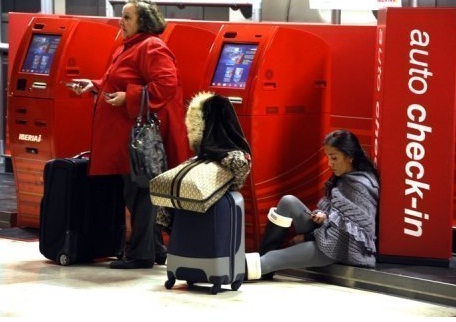An early cold snap in Europe claimed more lives Saturday, and a wildcat strike by Spanish air traffic controllers added to the travel chaos caused by snow, ice, and in some countries flooding.
Freezing weather killed another nine people in Poland over a 24-hour period, bringing the death toll there to 46 since the beginning of November, police said.
Temperatures there dropped as low as minus 19 degrees Celsius (minus 2 Fahrenheit) overnight Friday.
In the neighbouring Czech Republic, it was minus 20 Celsius (minus 4 Fahrenheit) overnight, disrupting rail traffic as the ice seized up signals at several junctions.
French police blamed icy driving conditions for three deaths in the east of the country after a car slid off the road and into a canal near Plobsheim late Friday. Neither the driver nor the passengers had been drinking, police added.
Weather forecasters warned of black ice in northern France that would make driving particularly dangerous.
Officials in the French Alps meanwhile warned to watch for avalanches on Sunday in ski stations already open because of the early snow. The danger would increase Monday with fresh snowfalls and a subsequent thaw, they added.
The roof of a building at the Flamanville nuclear power station in northern France partially collapsed under the weight of snow overnight Friday, power company EDF said.
The building contained about 10 barrels of low-level radioactive waste, but France's nuclear safety agency, the ASN, classed the incident one on a scale of seven, at the bottom of the scale of seriousness.
Civil aviation officials asked airlines flying out of Charles de Gaulle, Paris' main airport, to cut back their flights by 20 percent during daylight to ease the pressure caused by the snow and ice there.
In Spain, the disruption to air traffic came mainly from a wildcat strike by air traffic controllers, which ran from Friday to Saturday evening, hitting an estimated 300,000 passengers over a long holiday weekend.
The government there put the military in command of the skies and threatened to prosecute the strikers, who had called in sick en masse rather than staging a formal strike. By Saturday afternoon, they were returning to work.

Britain's Transport Secretary Phil Hammond relaxed the maximum-hours restrictions for lorry drivers to keep the country's vital supplies moving.
"This will help us with deliveries of fuel, it will help supermarket chains with their deliveries to their stores and it will help with deliveries of salt around the country," he said.
The wintry weather has disrupted road, rail and air travel in Britain over the past few days. In many parts of England and Wales however, the snows were melting away.
Ski resorts in Scotland warned of the risk of avalanches, but the thaw there was also helping rail traffic, badly disrupted by the recent snow, to slowly get back on track.
In Switzerland, Geneva's University Hospital cancelled non-urgent operations scheduled for Monday and Tuesday to cope with a massive flow of broken bones caused by people slipping and falling in icy conditions. Operating theatres were working overtime through the weekend.
Stay tuned, a lot going on across Europe right now.